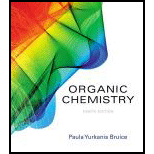
Concept explainers
(a)
Interpretation:
To draw the structure of the given compounds.
Concept introduction:
The structure of the organic compound and its name are closely related to each other. The structure of the compound can be drawn if the name is given and vice-versa. The name of an organic compounds tells about the number of carbons present in the compound which is necessary so as to draw the carbon skeleton in the structure. The suffix of the name of the compound provides information about the
(a)
Answer to Problem 48P
The structure of N,N-dimethylhexanamide is:

Explanation of Solution
The structure of the compound can be drawn if the name is given and vice-versa. The name of the compound is N,N-dimethylhexanamide. It indicates that six carbons are present in the compound. The suffix is ‘amide’ indicating the presence of an amide group
Thus, the structure is drawn as,

(b)
Interpretation:
To draw the structure of the given compounds.
Concept introduction:
The structure of the organic compound and its name are closely related to each other. The structure of the compound can be drawn if the name is given and vice-versa. The name of an organic compounds tells about the number of carbons present in the compound which is necessary so as to draw the carbon skeleton in the structure. The suffix of the name of the compound provides information about the functional group present in the compound.
(b)
Answer to Problem 48P
The structure of 3,3-dimethylhexanamide is:

Explanation of Solution
The structure of the compound can be drawn if the name is given and vice-versa. The name of the compound is 3,3-dimethylhexanamide. It indicates that six carbons are present in the compound. The suffix is ‘amide’ indicating the presence of an amide functional group
Thus, the structure is drawn as,

(c)
Interpretation:
To draw the structure of the given compound.
Concept introduction:
The structure of the organic compound and its name are closely related to each other. The structure of the compound can be drawn if the name is given and vice-versa. The name of an organic compounds tells about the number of carbons present in the compound which is necessary so as to draw the carbon skeleton in the structure. The suffix of the name of the compound provides information about the functional group present in the compound.
(c)
Answer to Problem 48P
The structure of
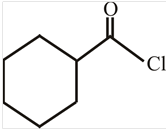
Explanation of Solution
The structure of the compound can be drawn if the name is given and vice-versa. The name of the compound is
Thus, the structure is drawn as,

(d)
Interpretation:
To draw the structure of the given compound.
Concept introduction:
The structure of the organic compound and its name are closely related to each other. The structure of the compound can be drawn if the name is given and vice-versa. The name of an organic compounds tells about the number of carbons present in the compound which is necessary so as to draw the carbon skeleton in the structure. The suffix of the name of the compound provides information about the functional group present in the compound.
(d)
Answer to Problem 48P
The structure of

Explanation of Solution
The structure of the compound can be drawn if the name is given and vice-versa. The name of the compound is
Thus, the structure is drawn as,

(e)
Interpretation:
To draw the structure of the given compounds.
Concept introduction:
The structure of the organic compound and its name are closely related to each other. The structure of the compound can be drawn if the name is given and vice-versa. The name of an organic compounds tells about the number of carbons present in the compound which is necessary so as to draw the carbon skeleton in the structure. The suffix of the name of the compound provides information about the functional group present in the compound.
(e)
Answer to Problem 48P
The structure of

Explanation of Solution
The structure of the compound can be drawn if the name is given and vice-versa. The name of the compound is
Thus, the structure is drawn as,

(f)
Interpretation:
To draw the structure of the given compound.
Concept introduction:
The structure of the organic compound and its name are closely related to each other. The structure of the compound can be drawn if the name is given and vice-versa. The name of an organic compounds tells about the number of carbons present in the compound which is necessary so as to draw the carbon skeleton in the structure. The suffix of the name of the compound provides information about the functional group present in the compound.
(f)
Answer to Problem 48P
The structure of

Explanation of Solution
The structure of the compound can be drawn if the name is given and vice-versa. The name of the compound is
Thus, the structure is drawn as,

(g)
Interpretation:
To draw the structure of the given compounds.
Concept introduction:
The structure of the organic compound and its name are closely related to each other. The structure of the compound can be drawn if the name is given and vice-versa. The name of an organic compounds tells about the number of carbons present in the compound which is necessary so as to draw the carbon skeleton in the structure. The suffix of the name of the compound provides information about the functional group present in the compound.
(g)
Answer to Problem 48P
The structure of
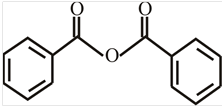
Explanation of Solution
The structure of the compound can be drawn if the name is given and vice-versa. The name of the compound is
The suffix is ‘anhydride’ indicating the presence of indicating the presence of an acid anhydride group in which the
Thus, the structure is drawn as,

(h)
Interpretation:
To draw the structure of the given compound.
Concept introduction: The structure of the organic compound and its name are closely related to each other. The structure of the compound can be drawn if the name is given and vice-versa. The name of an organic compounds tells about the number of carbons present in the compound which is necessary so as to draw the carbon skeleton in the structure. The suffix of the name of the compound provides information about the functional group present in the compound.
(h)
Answer to Problem 48P
The structure of
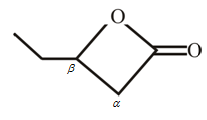
Explanation of Solution
The structure of the compound can be drawn if the name is given and vice-versa. The name of the compound is
Thus, the structure is drawn as,

(i)
Interpretation:
To draw the structure of the given compounds.
Concept introduction:
The structure of the organic compound and its name are closely related to each other. The structure of the compound can be drawn if the name is given and vice-versa. The name of an organic compounds tells about the number of carbons present in the compound which is necessary so as to draw the carbon skeleton in the structure. The suffix of the name of the compound provides information about the functional group present in the compound.
(i)
Answer to Problem 48P
The structure of 3-methylbutanenitrile is:

Explanation of Solution
The structure of the compound can be drawn if the name is given and vice-versa. The name of the compound is 3-methylbutanenitrile. It indicates that four carbons are present in the carbon skeleton of the compound. The suffix is ‘nitrile’ indicating the presence of a nitrile functional group. There is a methyl group on the third carbon in the chain. The numbering of carbons starts from the functional group side.
Thus, the structure is drawn as,

(j)
Interpretation:
To draw the structure of the given compound.
Concept introduction: The structure of the organic compound and its name are closely related to each other. The structure of the compound can be drawn if the name is given and vice-versa. The name of an organic compounds tells about the number of carbons present in the compound which is necessary so as to draw the carbon skeleton in the structure. The suffix of the name of the compound provides information about the functional group present in the compound.
(j)
Answer to Problem 48P
The structure of
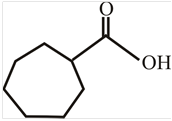
Explanation of Solution
The structure of the compound can be drawn if the name is given and vice-versa. The name of the compound is
Thus, the structure is drawn as,

(k)
Interpretation:
To draw the structure of the given compound.
Concept introduction:
The structure of the organic compound and its name are closely related to each other. The structure of the compound can be drawn if the name is given and vice-versa. The name of an organic compounds tells about the number of carbons present in the compound which is necessary so as to draw the carbon skeleton in the structure. The suffix of the name of the compound provides information about the functional group present in the compound.
(k)
Answer to Problem 48P
The structure of
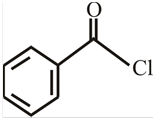
Explanation of Solution
The structure of the compound can be drawn if the name is given and vice-versa. The name of the compound is
Thus, the structure is drawn as,

Want to see more full solutions like this?
Chapter 15 Solutions
Pearson eText Organic Chemistry -- Instant Access (Pearson+)
- 8:17 PM Sun Mar 30 Draw the major product of this reaction. Ignore inorganic byproducts. HSCH2CH2CH2SH, BF3 Probler Drawing Ato Bonds Clarrow_forwardpresented by Mr L How the coprion. (Il Done in no wraction, dew the starting redential) доarrow_forward8:16 PM Sun Mar 30 K Draw the major product of this reaction. Ignore inorganic byproducts. Proble 1. CH3MgBr 2. H3O+ F Drawingarrow_forward
- о но оarrow_forwardName the major organic product of the following action of 4-chloro-4-methyl-1-pentanol in neutral pollution 10+ Now the product. The product has a molecular formula f b. In a singly hain, the starting, material again converts into a secule with the molecular kormula CIO. but with comply Draw the major organic structure inhalationarrow_forwardMacmillan Learning Alcohols can be oxidized by chromic acid derivatives. One such reagent is pyridinium chlorochromate, (C,H,NH*)(CICTO3), commonly known as PCC. Draw the proposed (neutral) intermediate and the organic product in the oxidation of 1-butanol by PCC when carried out in an anhydrous solvent such as CH₂C₁₂. PCC Intermediate OH CH2Cl2 Draw the intermediate. Select Draw Templates More с H Cr о Product Draw the product. Erase Select Draw Templates More H о Erasearrow_forward
- If I have 1-bromopropene, to obtain compound A, I have to add NaOH and another compound. Indicate which compound that would be. A C6H5 CH3arrow_forwardProvide the reagents for the following reactions.arrow_forwardIf I have 1-bromopropene, to obtain compound Z, I have to add two compounds A1 and A2. Indicate which compounds are needed. P(C6H5)3arrow_forward
- Draw the major product of this reaction. Ignore inorganic byproducts. Assume that the water side product is continuously removed to drive the reaction toward products. O CH3CH2NH2, TSOH Select to Draw >arrow_forwardPredict the major organic product(s) for the following reaction.arrow_forwardPredict the major organic product(s) for the following reactions.arrow_forward
 ChemistryChemistryISBN:9781305957404Author:Steven S. Zumdahl, Susan A. Zumdahl, Donald J. DeCostePublisher:Cengage Learning
ChemistryChemistryISBN:9781305957404Author:Steven S. Zumdahl, Susan A. Zumdahl, Donald J. DeCostePublisher:Cengage Learning ChemistryChemistryISBN:9781259911156Author:Raymond Chang Dr., Jason Overby ProfessorPublisher:McGraw-Hill Education
ChemistryChemistryISBN:9781259911156Author:Raymond Chang Dr., Jason Overby ProfessorPublisher:McGraw-Hill Education Principles of Instrumental AnalysisChemistryISBN:9781305577213Author:Douglas A. Skoog, F. James Holler, Stanley R. CrouchPublisher:Cengage Learning
Principles of Instrumental AnalysisChemistryISBN:9781305577213Author:Douglas A. Skoog, F. James Holler, Stanley R. CrouchPublisher:Cengage Learning Organic ChemistryChemistryISBN:9780078021558Author:Janice Gorzynski Smith Dr.Publisher:McGraw-Hill Education
Organic ChemistryChemistryISBN:9780078021558Author:Janice Gorzynski Smith Dr.Publisher:McGraw-Hill Education Chemistry: Principles and ReactionsChemistryISBN:9781305079373Author:William L. Masterton, Cecile N. HurleyPublisher:Cengage Learning
Chemistry: Principles and ReactionsChemistryISBN:9781305079373Author:William L. Masterton, Cecile N. HurleyPublisher:Cengage Learning Elementary Principles of Chemical Processes, Bind...ChemistryISBN:9781118431221Author:Richard M. Felder, Ronald W. Rousseau, Lisa G. BullardPublisher:WILEY
Elementary Principles of Chemical Processes, Bind...ChemistryISBN:9781118431221Author:Richard M. Felder, Ronald W. Rousseau, Lisa G. BullardPublisher:WILEY





